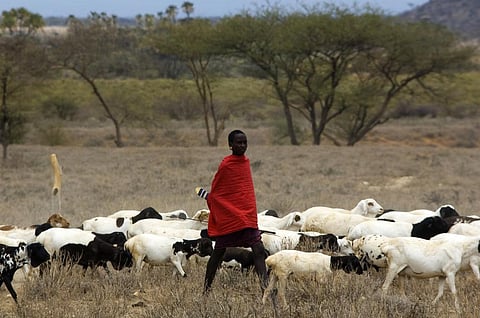

A new report released by Survival International, an international non-government organisation working for the rights and welfare of indigenous communities across the world, highlighted major flaws in the Northern Kenya Grassland Carbon Project.
The project run by the Northern Rangelands Trust (NRT) is being touted as a flagship carbon credits scheme by NRT. Social media conglomerate Meta Platforms, Inc (formerly Facebook) and streaming service Netflix, Inc have bought large chunks of the carbon credits generated through this project.
Project proponents say that they could generate around $300-500 million or more. But it comes at the expense of the people who have been living on these lands for generations and have been grazing their cattle, camels and other domestic animals following their long-standing traditions, according to the authors of the report.
The new project relies on breaking down these traditional grazing systems and replacing them with a centrally controlled system more akin to commercial ranching.
Blood Carbon: how a carbon offset scheme makes millions from Indigenous land in Northern Kenya was released March 16, 2022 by the non-profit. It analyses the NRT project stating that it is being run on the land inhabited by more than 100,000 Indigenous people from Samburu, Borana and Rendille communities.
In its first crediting period (2013-2016), the project generated 3.2 million carbon credits, the report stated. By January 2022, all of these had been sold.
The exact total value of these sales is not known, but is likely to have been between $21 million and $45 million. Most were sold in large blocks, including 180,000 to Netflix and 90,000 to Meta.
A second batch of credits for 2017-2020 was claimed by the project in April 2022. Although no verification report of these had been published by the end of January 2023, another 3.5 million credits were verified, and the credits started to be issued in December 2022.
By February 2023, 1.3 million of these had been sold, mostly again in very large (and anonymous) blocks.
The basic premise of the project is that it can enforce ‘planned rotational grazing’ within specified geographical areas and runs fundamentally against the traditional indigenous pastoralism of the area, the report said. It calls the project ‘conceptually seriously misguided, potentially dangerous and probably doomed to fail’.
Survival’s ‘Blood Carbon’ campaign was also launched with the release of the report. The campaign highlights how the sale of carbon credits from Protected Areas could massively increase the funding of human rights abuses against indigenous peoples, while doing nothing to combat climate change.
The report’s author Simon Counsell, former director of Rainforest Foundation UK, said:
NRT’s carbon project fails to comply with some of the basic requirements for carbon offsetting projects, such as showing clear additionality, having a proper baseline and being able to measure carbon ‘leakage’ to other areas.
“The mechanisms for monitoring the implementation and impacts of the project are fundamentally flawed,” he added. “It is extremely implausible that the carbon credits being sold by the project represent any real additional storage of carbon in the area’s soils.”
The authors of the report and other members of the NGO have written that the project is based on a long colonial prejudice that sees pastoralists as incapable of managing their own environment and constantly destroying it by overgrazing.
“After years of violating human rights in the name of so-called “conservation”, now Western NGOs are stealing Indigenous land in the name of “climate mitigation”,” said Fiore Longo, head of Survival’s Decolonize Conservation campaign.
As this report clearly shows, NRT´s project is based on the same colonial and racist misconception that pervades many big conservation projects: that Indigenous peoples are to blame for environmental destruction, she added.
“But the evidence shows precisely the opposite – that Indigenous peoples are the best conservationists.” said Longo. “This project is not just dangerous greenwashing, it’s blood carbon: NRT is making money by destroying the way of life of those least responsible for climate change.”
The report has further found that the project proponents have not even properly informed the communities about this project, let alone received their free, prior and informed consent.
“Provision of information about the project has been limited to very small numbers of people, frequently long after the project had advanced,” reads the report.
“The project’s legal basis, including whether NRT has the right to obtain some or all of the traded carbon, and compliance with applicable laws, especially the Community Lands Act 2016, are highly questionable,” the report added.